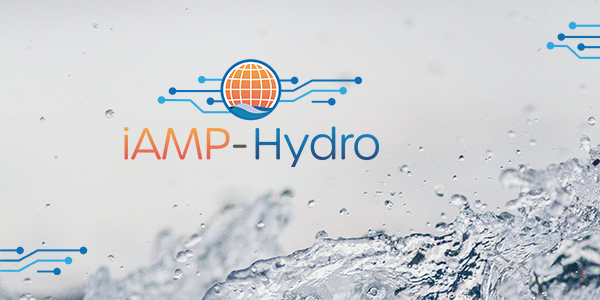 Welcome to the first iAMP-Hydro NewsletterSometimes
a little time is needed for being able to show something concrete. In
our case this is the installation work of sensors which are needed to
achieve some of the objectives that the iAMP-Hydro project has set
itself. Thus, in this newsletter you’ll receive general information
about the iAMP-Hydro project, and you will be informed about one of the
key objectives that have been carried out by the project partners, the
sensor installations.
|
 The projectThe
iAMP-Hydro project is an answer to a development of two different
future challenges. On the one hand more and more volatile Renewable
Energy Sources (RES) like PV and Wind Energy are installed worldwide.
While this is in general a good development, it is known that too much
installed capacity of these volatile RES bring electricity grids in
certain moments to its limits, either too much, or (very seldom) too
few, like the days of 'Dunkelflaute' (dark doldrums) in November 2024
and January 2025. In either of these situations, hydropower has shown
that it can provide a significant contribution to grid flexibility and
security, as it can modulate generation very rapidly and be stopped and
restarted smoothly.
On the other hand the EU electricity sector is already undergoing a
fundamental change with the increase of digitalisation. As a result,
power systems are more deeply monitored, and artificial intelligence
(AI) and big-data are implemented in daily operations. A fully
digitalised energy park could best cope with different situations for
the electricity sector.
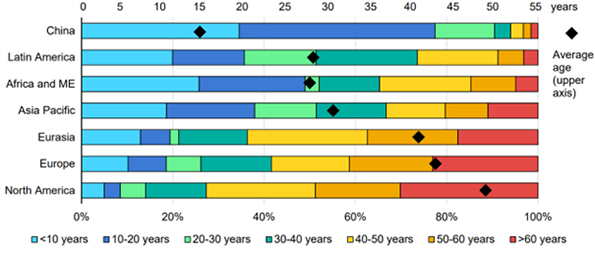
Age profile of installed hydropower capacity, 2020 (Source: Hydropower Special Market Reports, International Energy Agency)
However,
as can be seen above, the current hydro fleet in the EU is aged, and it
is estimated that 50% of the fleet will require upgrade actions by
2030. In particular, modernisation actions related to digitalisation are
required in the short to medium term, in order to offer enhanced
services, increase grid flexibility, environmental and socio-economic
sustainability and to foster the green and digital transitions in
Europe.
The iAMP-Hydro project partners have identified specific needs (SN) and challenges that need to be addressed:
- SN1. Reliable
and adaptable sensor technology and models for the prediction of
operation and maintenance of hydromechanical and electrical equipment;
- SN2. Sensors
and models for the assessment of the impact of plant operations on
environmental, biodiversity and socio-economic sustainability;
- SN3. Reliable
weather and flow forecasting models for predicting water availability,
power production planning, and management of downstream flow impacts;
- SN4.
Standardised secure data collection, communication and sharing protocols
to enable trusted, open and transparent digital optimisation across
multiple sensors, and interoperability between hydro operators and other
renewable energy plants;
- SN5. Decision
making algorithms which enable data-driven operation and maintenance to
increase flexibility, optimise performance in energy markets and
increase interoperability with other power sources; and
- SN6. Evidence
for policymaking which can support the acceleration of the
digitalisation of the existing fleet to increase flexibility,
sustainability, predictability, technology competitiveness, and
data-driven decision making through appropriate evidence-based
incentivisation, and by removing identified existing policy barriers.
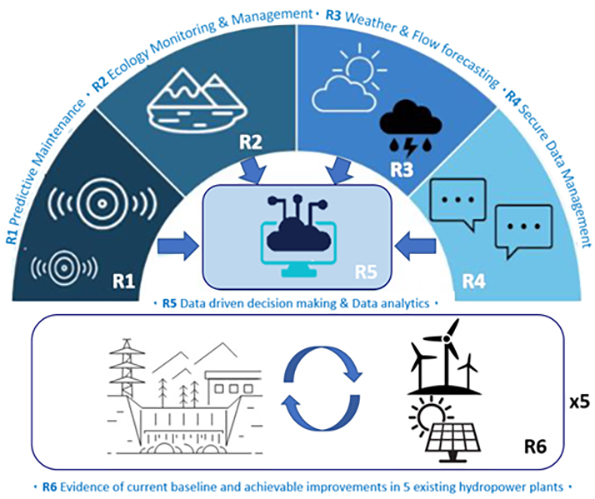
iAMP-Hydro project results to be worked on (Source: own figure)
iAMP-
Hydro will improve the digital operation of existing plants through the
development of 6 results which will collectively form iAMP - a novel
intelligent Asset Management Platform (result R5 in Fig. 2) encompassing
secure open and transparent data sharing protocols (R4) and three novel
digital solutions:
- R1. Condition monitoring and predictive maintenance modelling;
- R2. Ecological status monitoring and water management;
- R3. Improved weather and flow forecasting.
The
full package of digital solutions will be validated at five real-world
existing hydropower plants producing evidence for policy making to
support the green and digital transition of hydro (R6).
In this newsletter and in the following ones, we’ll reveal the work on the objectives (achieving the results mentioned above).
|
 Updates from R1. Condition monitoring and predictive maintenance modellingFollowing,
Bhaskar Paudel from Trinity College Dublin (Ireland) gives enthusiastic
insights about the work on sensor installations in the iAMP-Hydro
demonstrations sites:
“We are thrilled to share a major
milestone in the iAMP Hydro project! In January 2025, condition
monitoring sensors were successfully installed at our validation
hydropower plants in Greece—Makrochori (10 MW) and Asomata (108 MW)."
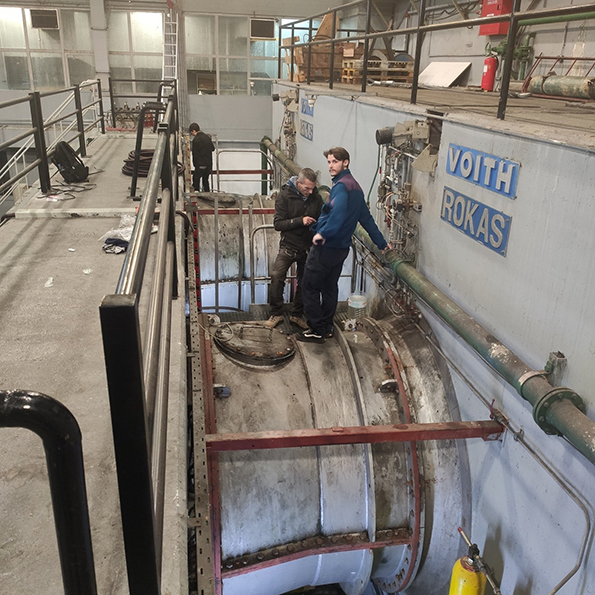
Sensor installation in progress at HPP Makrochori, Greece
This
was followed by installations in February 2025 at our Spanish demo
sites: Bermejales (2.1 MW), La Vega (2.4 MW), and Berchules (0.9 MW).
These efforts were carried out in close collaboration with our dedicated
demo site partners – Cuerva, PPC Renewables and PPC, along with the
team from Trinity College Dublin, who played a key role in defining
sensor specifications.
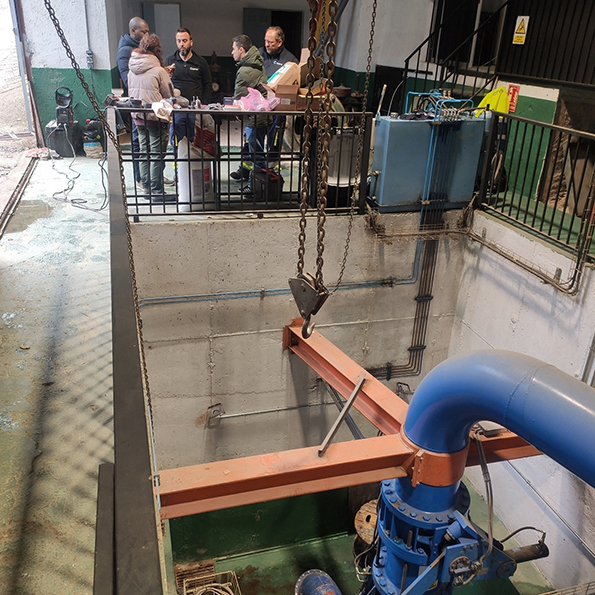
Discussion during sensor installation at HPP Bermejales, Spain
With
installations now complete, we eagerly anticipate the next phase—data
acquisition. This data will be crucial for advancing research in
predictive maintenance and optimisation of plant operations,
particularly through the development of deep learning algorithms. By
leveraging artificial intelligence, we aim to enhance fault detection,
reduce downtime, and improve the efficiency of European hydropower
plants.
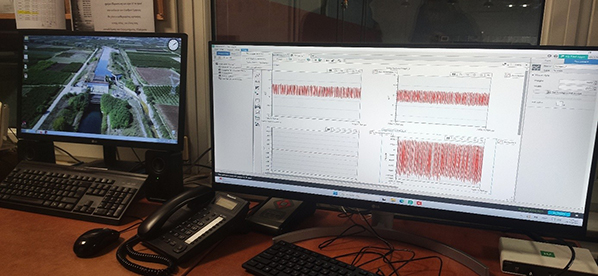
Data Acquisition visualization in Control Room
Stay
tuned as we dive deeper into data analysis, shaping the future of smart
hydropower operations! In the meantime, take a look at some snapshots
from our recent fieldwork.
|
 Follow our work on the websiteVisit our website www.iamp-hydro.eu to follow the journey for a digitalised sustainable future that serves us all.
 |
 Follow us on Social MediaDon’t miss any important achievements in the future.
|
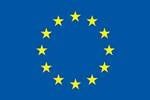 | www.iAMP-Hydro.eu
This
project has received funding from the European Union’s Horizon Europe
research and innovation programme under grant agreement No 101122167.
This newsletter reflects only the author's view and that the European
Commission is not responsible for any use that may be made of the
information it contains.
|
| |
Follow us on:
|
For further information please contact:
Project Coordinator
Ingo Ball • ingo.ball@wip-munich.de
WIP Renewable Energies
Sylvensteinstr. 2, 81369 Munich, Germany
www.wip-munich.de
|
| |
|
